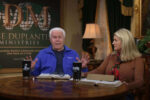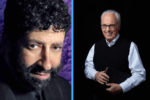Achieving true oneness with the trinity requires laying aside our own self or soul-life in order to live by the thoughts, desires and choices of Christ.
The bombing of the World Trade Center on September 11 changed all our perspectives. Nonbelievers watched the crumbling towers and faced their own mortality. Believers saw the beginning of the end.
Seeing that we have little time to allow the Holy Spirit to bring us into conformity to the life of Christ, we asked ourselves, How should we then live? We recognized that of ourselves we were sloppy, self-indulgent witnesses to Christ, and suddenly we were galvanized into a deadly seriousness about our Christian walk.
But what form is that seriousness to take? What will it entail for the believer who desires to be one with God?
THE PATTERN FOR DISCIPLESHIP The soul of the believer is the key to becoming a serious disciple of Christ. All that we desire in greater intimacy with Christ (see Song 7:10); all that we desire in being kept from the evil days ahead (see Mal. 3:16-17); and all that we desire in being “not,” as Enoch was (see Gen. 5:24)–lies in the consecration of our souls. (In one sense, to be “not” means to live in spirit and soul by God’s life and not by our own).
Christ said, “‘If anyone comes to Me, and does not hate his own father and mother and wife and children and brothers and sisters, yes, and even his own life, he cannot be My disciple'” (Luke 14:26, NASB). The Greek word for “life” in this verse means “soul-life.”
The soul consists of the mind, will and emotions. These faculties are the means by which we express our “selves”–our personality, our unique individuality–who we are in relation to others. It is not the soul that needs to be replaced but our natural or fleshly use of these faculties.
The enemy has whispered lies to us: that we would be like zombies or robots if we lived by the thoughts, desires and choices (the soul-life) of Christ instead of being our own persons. He has deceived us, as he did Eve, by saying that we can be like God when we know good and evil for ourselves (see Gen. 3:5).
But if expressing ones’ own soul-life or self is the pattern that results from original sin and that keeps us from discipleship and greater intimacy with God, what then is the correct pattern?
Simply put, the pattern is divine love in its supreme form. It began when there was only God. The Father had begun to bring forth His only Son, the Word (see John 1:1-2). And the Holy Spirit was proceeding from the Father through the Son (see John 15:26).
The Son is God even as the Father is God. “He [Christ]…is the exact representation of His [Father’s] nature” (Heb. 1:3). The Father gave His only begotten One the freedom to choose how He would exercise His Sonship.
How do we know that the Son had this choice? Because all human beings have the freedom of will, as Adam did, to choose God or to reject Him. Jesus said, “Let the one who wishes [wills] take the water of life without cost” (Rev. 22:17). Humanity has this free will because we are made in the likeness of God (see Gen. 1:27; James 3:9).
ABANDONING THE SOUL-LIFE Out of unfathomable love for His Father, the Son willingly chose to lay aside all expression of His own self or soul-life forever. He desired to reveal only the Person of His Father. This meant that He would live by the Father’s thoughts, desires, will, rights, ways, acts, words and preferences.
In fact, He declared more than once that He was unable to do anything on His own. “‘I can do nothing on My own initiative. As I hear [from the Father], I judge…I do not seek My own will, but the will of Him who sent Me'” (John 5:30); “‘The Son can do nothing of Himself [on His own], unless it is something He sees the Father doing'” (John 5:19); “‘For I did not speak on My own initiative, but the Father Himself who sent Me has given Me a commandment as to what to say'” (John 12:49).
But because He and the Father are one (see John 10:30), Jesus was also able to say, “‘He who has seen Me has seen the Father'” (John 14:9).
The eternal decision of self-sacrificial love by the Son moved the Holy Spirit to choose to reveal the Son instead of Himself. Jesus said, “‘He [the Holy Spirit] will not speak on His own initiative, but whatever He hears, He will speak…He will glorify Me; for He will take of Mine and will disclose it to you'” (John 16:13-14). The Holy Spirit does nothing on His own but searches the mind of the Father for His present will for exalting Christ Jesus (see 1 Cor. 2:10-11).
The act of eternal self-denying love by His Son and by the Holy Spirit must have drawn forth such love from within the Father that He chose to design creation–heaven and the vast universe in space–for one purpose: to witness to His Son. Everything created was to be a love gift to His Son. Paul said, “For by Him all things were created” (Col. 1:16).
The Father appointed Jesus “heir of all things” (Heb. 1:2). Because He loves Him, He “‘[gave] all things into His hand'” (John 3:35). This means He made the Son to be sovereign over all creation and gave Him “‘all authority…in heaven and on earth'” (Matt. 28:18).
The Trinity of God became one from the beginning through their loving self-denial. Jesus said, “‘Greater love has no one than this, that one lay down his [soul] life for his friends'” (John 15:13).
The glory of the persons of the Trinity issues from their voluntary self-sacrifice out of love for one another. Jesus said that His glory came from the love the Father had for Him before the foundation (creation) of the world (see John 17:24). The glory of the Trinity is to share one life of love, for there is no greater oneness than that.
CREATED FOR ONENESS Human beings were created in the image and likeness of the Son of God. We were created to become one with the Trinity of God in order to share in their eternal life of love together. Jesus prayed “‘that [believers] may all be one; even as Thou, Father, art in Me, and I in Thee, that they also may be in Us'” (John 17:21).
The most sublime aspect of human likeness to God is oneness with the Trinity through laying aside our own self or soul-life for the love of God and each other. “We know love by this, that He [Jesus] laid down His [soul] life for us; and we ought to lay down our [soul] lives for the brethren” that Christ might live through us to reveal His Father on behalf of others” (1 John 3:16).
To live a consecrated life we must forsake the individual use of our soul capacities (mind, will and emotions) and take up the personal cross that the Holy Spirit prepares for each one of us daily (see Mark 8:34). Jesus said, “‘For whoever wishes to save [hold on to] his [soul] life will [have to] lose it [eventually]; but whoever loses [abandons] his [soul] life for My sake [to have Mine] and the gospel’s will save it [for life in heaven]'” (v. 35).
Jesus said, “‘Truly, truly, I say to you, unless a grain of wheat falls into the earth and dies, it remains by itself alone; but if it dies [to its own form of life], it bears much fruit'” (John 12:24). He was referring to the death of the believer’s own soul-expression or self in order to have the soul-life of Jesus implanted and expressed through him to bear fruit on earth and for eternity.
Paul said that disciples are “always carrying about in the [human] body the dying [to oneself] of Jesus, that the [resurrected soul] life of Jesus also may be manifested in our body. For we who live [in Christ] are constantly being delivered over [by the Spirit] to death [to our old self] for Jesus’ sake, that the [resurrected soul] life of Jesus also may be manifested in our mortal flesh [body]” (2 Cor. 4:10-11).
Nothing that originates on earth can go with us into heaven. “Flesh and blood [that which is of the earth] cannot inherit the kingdom of God; nor does the perishable inherit the imperishable” (1 Cor. 15:50). The Father created us to manifest the glory of the Person of His Son (see 2 Thess. 2:14).
The only way for us to do this is to cooperate with the Holy Spirit as He continually works to keep our fleshly bodies and soul-lives incapacitated. The Spirit strongly opposes anything that originates from our souls and bodies–what the Bible calls “the flesh” in the evil sense.
He succeeds in disabling our soul-lives by resisting their use. We feel His resistance as a check in our consciences or a disturbance of the peace within our hearts (see Heb. 9:14; Col. 3:15)–as though doing what we want to do has hit a snag (see Gal. 5:17). As we participate in this process of daily dying to our self-expression, the Spirit gradually substitutes the thoughts, desires and decisions of Christ in us.
There is but one New Man in the kingdom (see Eph. 2:15). That Man is Christ Jesus, and we are to grow up in every way into Him (see Eph. 4:13,15). To live a consecrated life as a disciple we must exchange that which is born of the flesh for that which is born of the Spirit (see John 3:6). Nothing, absolutely nothing, of our old selves will pass into life in heaven–only that in us which is of the New Man, Christ Jesus our Lord (see 1 Cor. 15:50).
If we are really serious–and not just temporarily frightened by the events of our day–we must be willing to give up all use of our own natural souls in order to receive all that we have longed for in Christ. It is a crucial step to oneness with the Trinity of God.
“Anna” Rountree is actually a husband-and-wife team who spent several years in pastoral ministry. They are the authors of books including The Heavens Opened (Charisma House).







Leave a Comment
You must be logged in to post a comment.